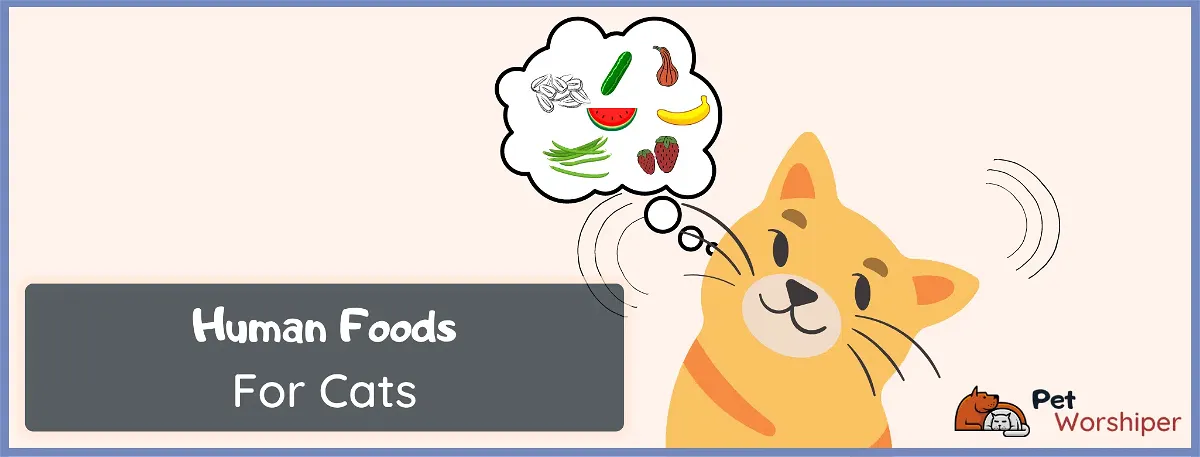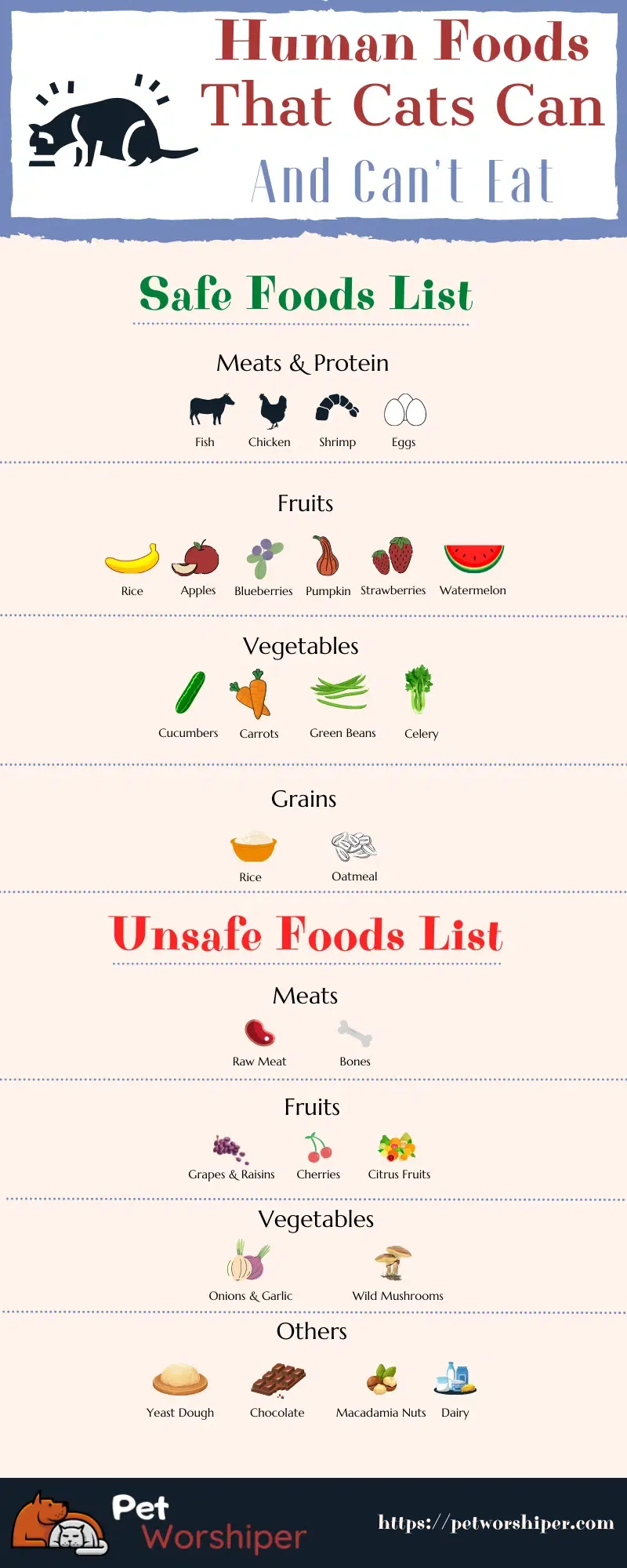
When preparing your afternoon snack in the kitchen, you may look down to find your feline friend begging for a taste of your food. This may cause you to question if the food item you’re eating is safe for your cat, and if so, how many other human foods are safe for cats?
As a licensed vet tech that worked in an emergency animal hospital for six years, I saw my fair share of cats that became ill from eating unsafe human foods. This has allowed me to learn what a cat can and cannot eat, and compile an informative list that can keep your furry friend safe!
In this article, we will list some of the safe and unsafe human foods for cats and break them down based on each food category. At the end of this read, you will be well versed in which food items can benefit your feline companion and which foods you should keep to yourself.
List of safe people foods for cats
- Fish
- Chicken
- Shrimp
- Eggs
- Bananas
- Apples
- Blueberries
- Pumpkin
- Strawberries
- Watermelon
- Cucumbers
- Carrots
- Green Beans
- Celery
- Rice
- Oatmeal
List of Unsafe people foods for cats
- Raw Meats
- Bones
- Grapes & Raisins
- Cherries
- Citrus Fruits
- Onions & Garlic
- Wild Mushrooms
- Yeast Dough
- Chocolate
- Macadamia Nuts
- Dairy

People Foods For Cats
You may be surprised to learn that not only are some human foods safe for our feline companions to eat, but many are packed with nutrients that benefit their health. There are many human foods that cats can safely enjoy, so let’s break it down based on each food category below.
Safe Foods List
Below is a list of human food items that cats can eat safely, as well as the nutrition value they have to offer. Though these food items are safe for cats to consume, they should not be a staple in their diet, but rather offered as a supplemental treat. Treats should only make up 10% of a cat’s diet, and this applies to the safe foods we list below.
Meats & Protein
Fish
Fish is a safe protein option that most cats are eager to consume. The best fish options for cats include salmon, cod, and tuna, as long as they are bone-free and fully cooked before serving. Fish itself contains beneficial fatty acids, minerals, and vitamins, and they can support everything from a cat’s immune health to coat appearance. Just be sure to leave out the fatty cooking oils or seasonings, as these can lead to an upset stomach in your cat.
Chicken
Chicken is a lean protein option that many feline friends enjoy. A lean cut of chicken that is fully cooked can be a wonderful source of protein for a cat and provides them with vitamin B6, vitamin B12, magnesium, and phosphorus. Just be sure to leave out any cooking oils and seasonings, as cats should only consume chicken that is as “naked” as possible.
Shrimp
Shrimp is another protein option from the sea that our feline friends adore. Shrimp is jam packed with beneficial nutrients that can boost a cat’s immune and coat health, and they are even known for promoting cardiac health. Shrimp contains ingredients such as calcium, protein, essential fatty acids, and phosphorus. As long as you leave out any seasonings or oils when cooking, your cats can safely enjoy the occasional shrimp treat.
Eggs
Cooked eggs are another safe protein option for the feline friends in our life. Either boiled or scrambled eggs can offer protein, vitamin D, vitamin B12, potassium, and iron. Just be sure that eggs are fully cooked when serving, as raw eggs can contain harmful bacteria that can lead to severe GI upset.
Fruits
Bananas
Bananas are a wonderful source of fiber and potassium for both humans and feline friends. The occasional bite of banana can be a healthy treat for curious cats, though you should limit this snack due to its high sugar content. When offered as the occasional snack, bananas are a healthy treat option.
Apples
Apples are another safe fruit option for the fruit-loving cats in our life. Apples serve as a wonderful source of fiber and antioxidants, as well as an array of vitamins that support immune health. Just be sure to remove any seeds from the piece you offer, as the seeds can release small traces of cyanide when chewed.
It’s not a considerable amount, but I often like to avoid these compounds in my cats’ diet.
Blueberries
Blueberries are tiny, delicious bombs of antioxidants. This fruit is known for being an immune health booster, as well as aiding in the fight against inflammation within the body. When offered in small amounts and as an occasional treat, they can provide your cat with a world of health benefits.
Pumpkin
Pumpkin is a common food item used to alleviate mild constipation in both cats and dogs. Pumpkin serves as an excellent source of fiber and magnesium, and both ingredients are known for promoting softer stool. Not only can pumpkin promote bowel movements in constipated cats, but it can also aid in treating diarrhea.
Though it may seem odd that a fruit can help with both constipation and diarrhea at the same time, it is true! Pumpkin can absorb water once it is digested, causing it to expand in the intestines and bulk up the soft stool. At the end of the day, this fruit is a wonderful tool in promoting healthy bowel movements.
Strawberries
Strawberries are a sweet treat that your cat can enjoy in small amounts. Strawberries contain nutrients such as potassium and vitamin C, as well as beneficial fiber. When offered as the occasional snack, strawberries can promote both immune and digestive support.
Watermelon
Watermelon is a hydrating fruit that both you and your cats can snack on in the hot summer months. This fruit is more than 90% water and contains an array of vitamins and minerals that benefit your cat’s health. As long as you remove any seeds or skin from the pieces you offer, your cat will love this refreshing treat.
Vegetables
Cucumbers
Cucumbers are another hydrating snack that many feline friends love. In addition to the vegetable being packed with water, cucumbers also contain magnesium, vitamin C, and vitamin K. Just be sure to peel the cucumber pieces before you give them to your cat, as the skin can be challenging to digest.
Carrots
Many of us were told just how good carrots can be for our eye health, and it is no different for our cats! Carrots contain a nutrient known as beta carotene, which is wonderful for boosting eye, immune, and coat health. Just be sure to cook the carrots before offering this snack to your cat, as uncooked carrots can be challenging for a cat to chew.
Green Beans
Fresh green beans are a healthy way to keep your cat fuller for more extended periods, without an excess of calories. Fresh green beans can be used to bulk up your cat’s food, but they also contain small amounts of protein. Just be sure only to give your cat fresh green beans, as canned green beans are often high in sodium.
Celery
Celery is another hydrating treat option that can be added to your cat’s meals on occasion. This snack is filled with water, but it also contains fiber that can promote healthy digestion in constipated cats. While pumpkin is more effective in combating constipation, celery is another option to consider.
Grains
Rice
Both brown and white rice are safe grain options when cats are experiencing GI upset. When paired with an approved lean protein, rice can assist in regulating digestive upset, without further irritating the gut. Cats do not require a surplus of grains in their daily diet, but they are safe to offer occasionally, or paired with lean protein in cats with an upset stomach.
Oatmeal
Oats are a safe source of fiber and iron for the feline friends in our life. Though cats do not necessarily need grains to maintain their overall health, it is perfectly safe for them to enjoy the occasional bite of oatmeal. Just be sure that your oatmeal does not contain any toxic fruits before letting your cat take a bite.
Unsafe People Foods For Cats
Just as there is a list of human foods that cats can safely consume, there are an array of food items that can be toxic to our feline friends. These food items range from causing mild GI upset to life-threatening complications, so it’s important to always keep them away from the cats in your home.
Unsafe Foods List
Below is a list of human food items that are unsafe and potentially toxic for cats. Though the level of toxicity of each food item below will vary, we suggest never offering any of them to your cat.
Meats
Raw Meats
Raw meat can contain harmful bacteria that can lead to severe GI upset for cats. Not only can this bacteria be dangerous for cats to consume, but preparing raw meats can also put the cat owner at risk as well. For these reasons we do not suggest offering your cat any raw meat, or any raw diet in general.
You should know that I am basically not opposed to a raw diet for cats. It can be a very beneficial diet if you do it properly. But here’s the keyword, right. It takes a lot of research and impeccable ingredients to introduce a raw diet to your cat safely.
Bones
Though our cat’s wild ancestors may have snacked on bones, it does not mean our domestic cats should. Bones can splinter and cause GI irritation when chewed, and can even cause intestinal blockage if large pieces are swallowed.
Fruits
Grapes & Raisins
Though the threat appears to be more substantial to our canine friends, grape and raisin consumption can still lead to kidney failure in cats and kittens. Recent studies believe the tartaric acid and potassium bitartrate are responsible for the toxic effect of grapes, and each grape contains an unidentifiable amount of these substances. For this reason, you should never give your cat any amount of grapes or raisins.
Cherries
Though the fleshy inside of cherries is typically safe for cats, the seeds of a cherry contain a harmful amount of cyanide. When these seeds are chewed, toxic amounts of cyanide can be released into the body, making it challenging for the red blood cells to transport oxygen. Due to this threat, we do not suggest offering any part of the cherry to your cat.
Citrus Fruits
Citrus fruits like oranges, grapefruit, and lemons can be extremely toxic to the furry friends in our home. While small amounts of the citric acid present in these fruits can cause GI upset, large amounts can lead to central nervous system complications. Citrus fruits do not offer any nutritional value that they can’t get from other fruits, so it’s best to keep them away from your cat.
Vegetables
Onions & Garlic
Both onions and garlic can lead to life-threatening anemia in cats and dogs. Even a tiny amount of these vegetables can cause toxicity in cats, making it essential to keep these ingredients away from your cat at all costs. This includes both onions and garlic themselves, and even food contains small amounts of these veggies.
Wild Mushrooms
While any store-bought mushrooms are typically safe for your cat to eat in small amounts, wild mushrooms can be extremely dangerous for cats. Wild mushrooms can cause symptoms ranging from vomiting to seizures in cats, so it’s essential to make sure you do not have mushrooms growing in your yard if you have a cat that goes outside.
Others
Yeast Dough
Dough that contains yeast can be toxic to cats due to the gas that is present in the yeast. This gas can build up within the cat’s stomach and intestines, leading to painful bloating. Some yeast can even produce alcohol (ethanol) as a byproduct, which can be potentially fatal if a large amount of the substance builds up within the body.
Chocolate
We often hear about chocolate being toxic to dogs, but it can be dangerous for our feline friends as well. Chocolate contains an ingredient known as theobromine, which is comparable to caffeine. Theobromine can lead to GI upset, increased heart rate, and seizures when consumed in excess.
Macadamia Nuts
Though experts have not determined the toxic ingredient in macadamia nuts, they do know the nut itself is dangerous for cats to consume. This nut can lead to GI upset and pancreatitis in our feline friends, so it’s best to keep them away from your cat at all times.
Dairy
Though many of us were led to believe that cow milk is safe for cats to drink, this couldn’t be further from the truth. Dairy products like milk and cheese can cause serious digestive complications for cats, ranging from painful gas to vomiting. If you have a kitten in your home that requires bottle feeding, be sure only to offer kitten formula.
What Should I Do If My Cat Eats Unsafe Food?
Even once you become aware of the dangerous human foods for cats, accidents can still happen. Whether your cat sneaks a bite of your meal or tear into your pantry in the middle of the night, sometimes cats consume food they shouldn’t. If this ever happens, it’s important to reach out to your veterinarian immediately.
Even if your cat is not showing any symptoms of toxicity, it is still vital to reach out to your vet for guidance. Some dangerous foods can take days to cause symptoms in cats, so it is never a good idea to simply assume your cat is fine. For example, grapes can take up to 72 hours to cause noticeable symptoms, and at that point, most cats have sustained severe kidney damage.
At the end of the day, it is always best to contact your vet for professional guidance. The sooner you have your cat assessed or cleared by a vet, the better their chance at making a full recovery.
Final Thoughts
As you can see, there are quite a few proteins, fruits, and veggies that our cats can safely consume. As long as you abide by the 10% rule in terms of offering treats to your cat, these human foods can offer your furry friend an array of health benefits.
If you are curious about the basics of diet and feeding amounts for the cat in your life, you can check out our detailed cat feeding guide here. We provide an in-depth look at just how much you should be feeding your cat each day, as well as the ingredients you should look for when purchasing cat food.

